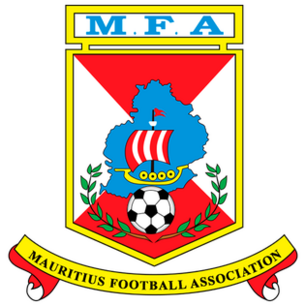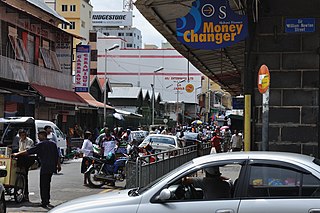
Mauritius, officially the Republic of Mauritius, is an island nation in the Indian Ocean about 2,000 kilometres (1,200 mi) off the southeast coast of the African continent, east of Madagascar. It includes the main island, as well as Rodrigues, Agaléga and St. Brandon. The islands of Mauritius and Rodrigues, along with nearby Réunion, are part of the Mascarene Islands. The main island of Mauritius, where most of the population is concentrated, hosts the capital and largest city, Port Louis. The country spans 2,040 square kilometres (790 sq mi) and has an exclusive economic zone covering 2,300,000 square kilometres (890,000 sq mi).

This article is about the demographic features of the population of Mauritius, including population density, ethnicity, education level, health of the populace, economic status, religious affiliations and other aspects of the population.

"Motherland" is the national anthem of Mauritius. The music was composed by Philippe Gentil, and the lyrics were written by Jean-Georges Prosper. The anthem is short and briefly describes the luscious landscape of Mauritius. It also mentions the qualities of its people: peace, justice and liberty.
Mauritius is a multi-ethnic and multi-language society; it is also a plural society with its population mainly composed of four ethnic groups and four major religious groups; it is often depicted as a "rainbow nation". The island of Mauritius did not have any indigenous population; historically, it was characterized by successive waves of European colonization and multiple immigrations. Under the French rule between 1715 and 1810, slaves were imported on the island from mainland Africa and Madagascar; slavery were only abolished in 1835 under the British rule. Indian migrants from Pondicherry first came in Mauritius under the French rule in 1736; The 18th century also saw one the earliest influx of Chinese migrants in Mauritius, who mostly came from Fujian. Under the British rule, more Indian migrants came to Mauritius following the slave emancipation of 1835. Since the 1800s Chinese migrants from Southern China arrived in Mauritius since the 1800s first as indentured labourers and later as free merchants. Since 1860, Hakka immigration started and continued until they become the dominant Chinese population in Mauritius since the beginning of the 20th century. The co-existence of Mauritians of Indian, African, European, and Chinese ancestry eventually led to a sharing of values and cultures, a collective participation in festivals, and an increased understanding between people of different ethnic backgrounds. Mauritians from different cultural backgrounds are very distinct from each other, and it is also highly unpopular to encourage the dissolution of cultural boundaries in Mauritius. In present days, the Mauritian society continues to be culturally and linguistically French-dominated.

Sega is one of the major music genres of Mauritius and Réunion. The other genres common in Mauritius are its fusion genre Seggae and Bhojpuri songs while in Réunion there is also seggae and maloya. It has origins in the music of slaves as well as their descendants Mauritian Creole people and is usually sung in Mauritian Creole or Réunionese Creole. Sega is also popular on the islands of Agaléga and Rodrigues as well as Seychelles, though the music and dances differ and it is sung in these islands' respective creole languages. In the past, the Sega music was made only with traditional instruments like ravanne and triangle, it was sung to protest against injustices in the Mauritian society, this particular version of the Sega is known as Santé engagé. Other types of Sega have been included in UNESCO's Intangible Cultural Heritage lists.
Mauritians of Chinese origin, also known as Sino-Mauritians or Chinese Mauritians, are Mauritians who trace their ethnic ancestry to China.

Vacoas-Phoenix also known as French: Villes Jumelles, is a town in Mauritius, located in the Plaines Wilhems District, the eastern part also lies in the Moka District. The town is administered by the Municipal Council of Vacoas-Phoenix. The town lies between Quatre Bornes and Curepipe.

The Mauritius Football Association (MFA) is the governing body of football in Mauritius. It was founded in 1952, affiliated to FIFA in 1964 and to CAF in 1965. The association was formerly known as the Mauritius Sports Association but renamed to Mauritius Football Association in 1984 through the introduction of a Sports Act by the government. The founding members of the association were FC Dodo, Faucon Flacq SC, CSC, Hounds, Royal College of Curepipe, and Saint Joseph College, all of which were based out of Curepipe and, with the exception of Flacq SC, have since ceased to exist. The Mauritius Football Association organizes the national football league and the national team.
Indo-Mauritians or Indian Mauritians are Mauritians who trace their ethnic ancestry to India or other parts of South Asia.

Mauritians are nationals or natives of the Republic of Mauritius and their descendants. Mauritius is a multi-ethnic society, with notable groups of people of South Asian, Sub-Saharan African, European, and Chinese descent, as well those of a mixed background from any combination of the aforementioned ethnic groups.
Mauritian Creoles are the people on the island of Mauritius and in the wider overseas Mauritian diaspora who trace their roots to continental Black Africans who came to Mauritius as slaves. It also refers to members of the island's mixed race or Métis community if they happen to be christian. In government records, creoles along with Franco-Mauritians form part of the broader group known as Population Générale.

Constituencies of Mauritius are the electoral boundaries within the Republic of Mauritius. They are also commonly referred to as Circonscriptions amongst the locals. The country follows the Westminster system and elects 60 members of parliament for a term of 5 years. There are in all 21 Constituencies in the republic, each of them returning 3 members with the exception of Constituency No 21, which returns only 2 members. The Constitution stipulates that there shall be 20 constituencies and one created specially for the Rodrigues island.

Mauritius was a Crown colony off the Southeast coast of Africa. Formerly part of the French colonial empire, British rule in Mauritius was established de facto with the Invasion of Isle de France in November 1810, and de jure by the subsequent Treaty of Paris. British rule ended on 12 March 1968, when Mauritius became independent.

The Constitution of Mauritius mentions no official language. It only contains a statement in Article 49 that "The official language of the Assembly shall be English but any member may address the chair in French" implying that English and French are official languages of the National Assembly (parliament). It is only in the Parliament that the official language is English but any member of the National Assembly can still address the chair in French. English and French are generally accepted as the official languages of Mauritius and as the languages of government administration and the court business, while the lingua franca is Creole.
Mauritius is a religiously diverse nation, with Hinduism being the most widely professed faith. People of Indian descent (Indo-Mauritian) follow mostly Hinduism and Islam. The Franco-Mauritians, Creoles and Sino-Mauritians follow Christianity. A minority of Sino-Mauritians also follow Buddhism and other Chinese-related religions. According to the 2011 census made by Statistics Mauritius, Hinduism is the major religion at 48.54%, followed by Christianity at 32.71%, followed by Islam 17.30% and Buddhism 0.18% in terms of number of adherents.
Mauritian Australians are Australians of Mauritian descent, or who were born in Mauritius.

Mauritian Creole or Morisien is a French-based creole language spoken in Mauritius. English words are included in the standardized version of the language. In addition, the slaves and indentured servants from cultures in Africa and Asia left a diverse legacy of language in the country. The words spoken by these groups are also incorporated into contemporary Morisien.
The 1999 Mauritian riots were national-scale rioting and protests in Mauritius following the death of the popular "seggae" musician Joseph Réginald Topize, better known by his stage name "Kaya", in police custody. The rioting lasted for four days from 21 to 25 February 1999. Four civilians and one police officer were killed in the riots with hundreds of people suffering injuries. It was the first incidence of mass rioting in Mauritius since the country's 1968 riots. The riots resulted in a majority of the island's police stations being sacked by protesters with 250 prisoners escaping prison. Many businesses were looted and substantial property damage was done with over 200 vehicles being set on fire.

Sir Charles Gaëtan Duval QC Kt was a barrister, statesman and politician from Mauritius who was the leader of the Parti Mauricien Social Démocrate (PMSD).









